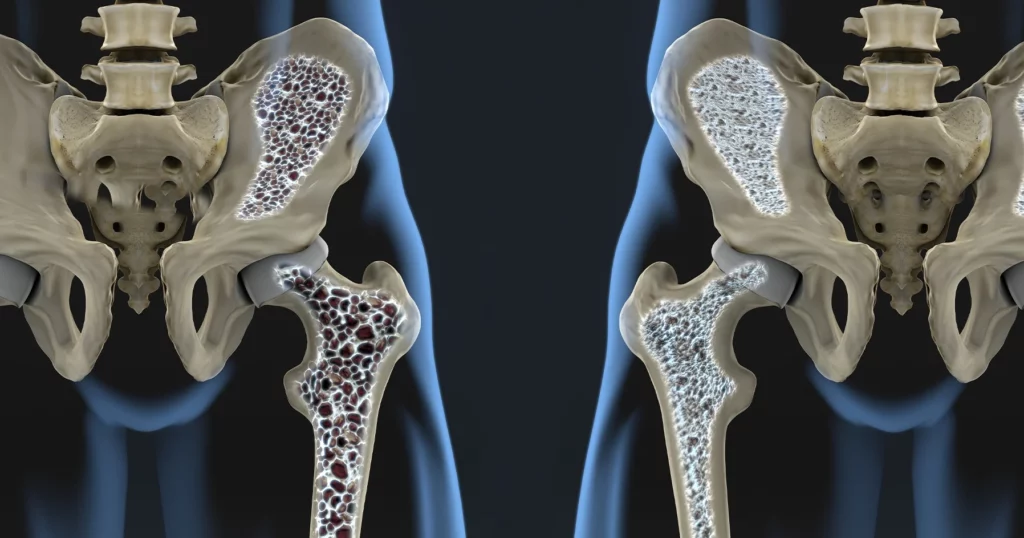Osteoporosis Specialist

Endocrinologist and Osteoporosis Specialist
located in Peachtree City, GA
Osteoporosis
Osteoporosis is a chronic condition that causes your bone density to decrease. Currently, it affects more than 53 million Americans. Without quick intervention and treatment, osteoporosis can affect your mobility and result in broken bones. At Peach State Endocrinology in Peachtree City, GA, Evgenia Korytnaya Scott, MD (Dr. K), specializes in Osteoporosis and Osteopenia. Schedule online or call to schedule an appointment with Dr. K today.
Learn about Osteoporosis diagnosis, treatment and fracture prevention at Bone Health and Osteoporosis Foundation.
More patient resources at International Osteoporosis Foundation.
Learn more about Osteoporosis Medications at Endocrine Society.
Osteoporosis
What is it:
Osteoporosis is a medical condition characterized by weakening of bones, making them fragile and more susceptible to fractures or breaks. It occurs when the density and quality of bone are reduced. Normally, bones are composed of a dense network of minerals, primarily calcium and phosphate, along with collagen protein, which gives them strength and structure.
In osteoporosis, there is an imbalance between the formation of new bone tissue and the removal of old bone tissue, leading to a reduction in bone density. As a result, bones become porous, brittle, and less able to withstand the usual stresses and strains placed on them. This makes individuals with osteoporosis more prone to fractures, especially in areas like the hip, spine, and wrist
Symptoms:
- Bone Fractures: Fractures are often the first noticeable symptom of osteoporosis. These fractures can occur with minimal trauma or even during routine activities like bending over, lifting, or falling from a standing height. Common fracture sites include the hip, spine (vertebrae), and wrist. Spinal fractures can lead to a loss of height and a stooped posture (kyphosis).
- Back Pain: Vertebral fractures can cause back pain, which may be gradual and progressive. This pain can be sharp or aching and is often worsened by activities like bending, lifting, or twisting.
- Loss of Height: As osteoporosis leads to vertebral fractures, it can result in a gradual loss of height and a stooped or hunched posture (kyphosis).
- Reduced Range of Motion: Fractures and bone loss can lead to a decreased range of motion and flexibility in the spine and other affected joints.
- Weakness: Weakening of the bones can lead to a general feeling of weakness and frailty, as well as difficulty in maintaining balance.
What causes it?
Osteoporosis is primarily caused by an imbalance in bone formation and resorption processes. Risk factors include aging, hormonal changes (especially in menopause and low testosterone levels), genetics, low calcium and vitamin D intake, sedentary lifestyles, smoking, and excessive alcohol consumption. Certain medical conditions and medications, as well as body size and ethnicity, can also increase susceptibility.
Diagnosis and Treatment:
- Bone Density Testing (DXA Scan): The primary method for diagnosing osteoporosis is a Dual-Energy X-ray Absorptiometry (DXA) scan. This non-invasive test measures bone density, typically at the hip and spine. Results are expressed as a T-score, which compares an individual’s bone density to that of a young, healthy adult. A T-score of -2.5 or lower indicates osteoporosis.
- Medical History and Risk Assessment: Healthcare providers will assess an individual’s medical history, family history, lifestyle factors, and any risk factors for osteoporosis.
- Laboratory Tests: Blood tests may be conducted to rule out other medical conditions that can affect bone health, such as hormonal disorders.
Treatment involves:
Treatment for osteoporosis aims to strengthen bones, reduce the risk of fractures, and manage underlying causes. The specific approach can vary based on individual circumstances, including the severity of the condition, age, and other health factors. Common treatment options include:
- Lifestyle Modifications:
- Dietary Changes: Increasing calcium and vitamin D intake through food or supplements.
- Regular Exercise: Safe weight-bearing exercises approved for patients with osteoporosis can help build and maintain bone density.
- Smoking Cessation and Limiting Alcohol: Quitting smoking and reducing alcohol consumption can benefit bone health.
- Medications:
- Antiresorptive medications, such as Bisphosphonates, RANK ligand inhibitor (Denosumab or Prolia).
- Anabolic Agents, such as Teriparatide (Forteo), Abaloparatide (Tymlos), Romosozumab (Evenity).
- Fall Prevention: Reducing the risk of falls is crucial. This can involve making the home environment safer, using assistive devices like canes or walkers, and addressing balance issues.
- Regular Monitoring: Follow-up bone density tests may be recommended to track progress and adjust treatment plans as needed.
The choice of treatment depends on individual factors, including the severity of osteoporosis, the presence of fractures, and potential side effects of medications. Endocrinologists like Dr. Evgenia Korytnaya work with patients to develop a personalized plan to manage and treat osteoporosis effectively while minimizing risks and addressing underlying causes.
Learn about Osteoporosis diagnosis, treatment and fracture prevention at Bone Health and Osteoporosis Foundation.
Learn more about Menopause and Bone Loss at Endocrine Society.
Read about Breast Cancer and Bone Loss here.
